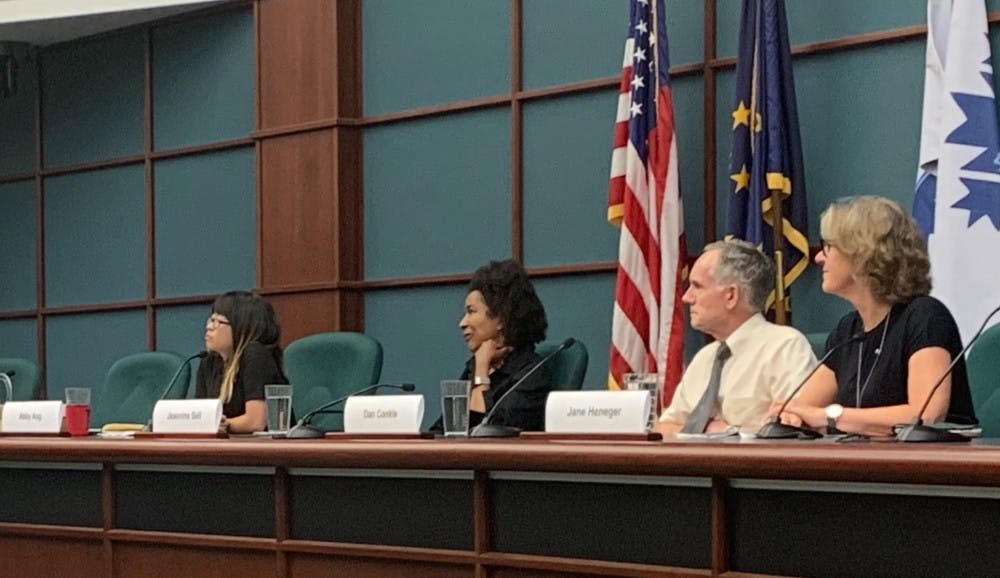Schooner Creek Farm was never mentioned by name at a Thursday night panel to discuss potential legal issues for removing a vendor from the Bloomington Community Farmers’ Market. Still, it was clear throughout the panel which vendor was in question.
The panel was the latest in a series of responses to a letter sent to the farmers’ market in June alleging the owners of Schooner Creek Farm, Sarah Dye and Douglas Mackey, were members of the white supremacist group Identity Evropa. The over-200 cosigners demanded the farmers’ market remove Schooner Creek Farm.
As Bloomington director of public engagement and the panel’s moderator, Mary Catherine Carmichael, introduced the panel, she said the market was a community asset.
“It’s wholly appropriate that we wish to protect this asset from any threats to its success and continue to work to improve it,” Carmichael said.
The farmers’ market has maintained it cannot remove vendors for their personal beliefs because it would violate their First Amendment rights. Several attendees at a June 17 Farmers’ Market Advisory Council meeting challenged this position, discussing how the state of Virginia had fired two police officers for their ties to white supremacist groups.
If that meeting was for Bloomington citizens to share their concerns, Thursday’s panel was for them to ask questions. Carmichael asked questions that had been aggregated from comments from previous public meetings and emails submitted to the city, and attendees submitted handwritten questions on index cards.
Panelists included Abby Ang, an IU Ph.D. student who sent the Schooner Creek Farm letter, Jeannine Bell, an IU Maurer School of Law professor who specializes in hate crimes, Dan Conkle, a Maurer School of Law professor emeritus and an adjunct professor of religious studies, and Jane Henegar, the executive director of the American Civil Liberties Union of Indiana.
The panel answered a wide range of questions about the city’s responsibilities under the First Amendment and addressing hate speech and racism in Bloomington. Ang said she was encouraged by the bigger conversations people are having about inclusivity at the market.
“This issue is far beyond just this one vendor at the market,” she said.
Bell said while most First Amendment discussions assume everyone will reasonably listen to each other’s ideas, she said extremists will not engage in an exchange of ideas.
“They’re set entirely in what they think about me and people who look like me, and they don’t want any exchange,” Bell said. “So much for the marketplace of ideas.”
Bell, Conkle and Henegar agreed the city could not legally remove a vendor for its beliefs or affiliation with hate groups. Henegar said if a municipality tried to remove vendors for their beliefs, it could face a lawsuit from the ACLU.
In response, Ang asked what the city would do to combat racism within the Bloomington community. Carmichael also asked what responsibility a city has to make public spaces feel safe.
Henegar said increased physical security at the market might not make people feel safer.
“First of all, we, the ACLU, always want to remind government to be mindful of the effects of over-policing or even tipping into militarization,” Henegar said.
Instead, Bell suggested the city could talk with vendors individually about their experiences and safety.
Henegar said the city could send in testers to the market to observe conditions, similar to those used to investigate violations of the Fair Housing Act.
Both Paula McDevitt, director of the Parks and Recreation Department, and Beverly Calender-Anderson, director of the Community and Family Resources Department, said their departments would be holding future events to discuss issues of inclusivity.
McDevitt said the Farmers’ Advisory Council had also created a new “Broadening Inclusion” subcommittee to address citizens’ questions and concerns.
Other questions took on matters of privacy, such as why the market does not allow anonymous complaints against vendors. Ang said some people feel uncomfortable sharing their experiences since farming communities can be tight-knit and suggested a third-party for complaints.
“I think this town can get pretty gossipy,” Ang said. “I can assume that people would be afraid it would get around, and then they’ll be ostracized for that.”
The panel discussed the legality of people recording or taking pictures in a public place. Some protesters expressed concerns at the June 17 meeting about being recorded by the Schooner Creek Farm vendors and their supporters.
While it is legal to record or take pictures in a public space, Bell said city workers at the farmers’ market can let people recording know they are making others uncomfortable.
One audience member asked why Nazi propaganda is protected under the First Amendement.
“Lies are protected by the First Amendment,” Bell said. “Strange but true.”
Conkle said in other Western countries, hate speech is illegal. However, many court cases in the United States have protected offensive speech.
“In the American system, we have — I think it’s fair to say, for right or for wrong — the almost radical protection of speech, including speech that most people regard as highly offensive,” he said.
The final question asked how people can effectively respond to extremism. Bell said she thinks many assumed white supremacy was not an issue before the 2016 presidential election. To combat extremism, she suggested organizing against it and voting in elections.
Henegar said fighting extremism requires consistent vigilance.
“We can’t censor it, but we can fight it,” she said.




